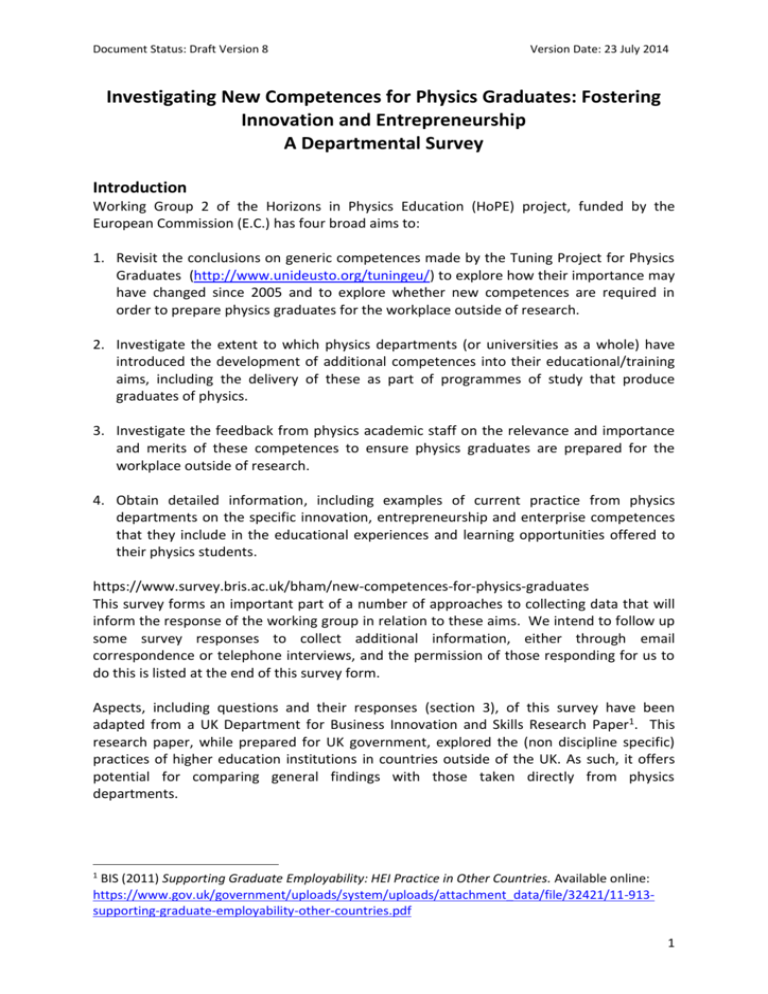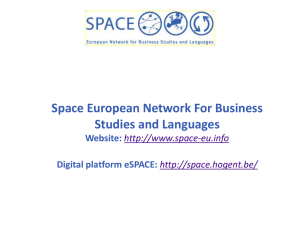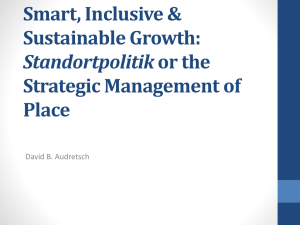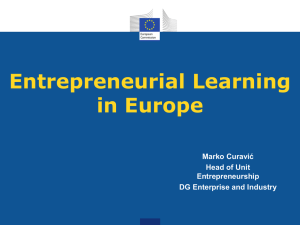Draft Departmental Survey - Version 8_VN
advertisement

Document Status: Draft Version 8 Version Date: 23 July 2014 Investigating New Competences for Physics Graduates: Fostering Innovation and Entrepreneurship A Departmental Survey Introduction Working Group 2 of the Horizons in Physics Education (HoPE) project, funded by the European Commission (E.C.) has four broad aims to: 1. Revisit the conclusions on generic competences made by the Tuning Project for Physics Graduates (http://www.unideusto.org/tuningeu/) to explore how their importance may have changed since 2005 and to explore whether new competences are required in order to prepare physics graduates for the workplace outside of research. 2. Investigate the extent to which physics departments (or universities as a whole) have introduced the development of additional competences into their educational/training aims, including the delivery of these as part of programmes of study that produce graduates of physics. 3. Investigate the feedback from physics academic staff on the relevance and importance and merits of these competences to ensure physics graduates are prepared for the workplace outside of research. 4. Obtain detailed information, including examples of current practice from physics departments on the specific innovation, entrepreneurship and enterprise competences that they include in the educational experiences and learning opportunities offered to their physics students. https://www.survey.bris.ac.uk/bham/new-competences-for-physics-graduates This survey forms an important part of a number of approaches to collecting data that will inform the response of the working group in relation to these aims. We intend to follow up some survey responses to collect additional information, either through email correspondence or telephone interviews, and the permission of those responding for us to do this is listed at the end of this survey form. Aspects, including questions and their responses (section 3), of this survey have been adapted from a UK Department for Business Innovation and Skills Research Paper1. This research paper, while prepared for UK government, explored the (non discipline specific) practices of higher education institutions in countries outside of the UK. As such, it offers potential for comparing general findings with those taken directly from physics departments. 1 BIS (2011) Supporting Graduate Employability: HEI Practice in Other Countries. Available online: https://www.gov.uk/government/uploads/system/uploads/attachment_data/file/32421/11-913supporting-graduate-employability-other-countries.pdf 1 Document Status: Draft Version 8 Version Date: 23 July 2014 In this survey we are focused upon physics graduates who follow a path other than a research career in physics. Section 1: Background This section is to determine context-based information about your institution that will allow us to classify and understand the context of individual responses. 1. In which country is your institution located? 2. Approximately how many students currently enter your university each academic year, to study physics at: a. Physics Bachelor Programmes (for example BSc)? b. Integrated Master’s level programmes (for example MPhys or MSci)? c. Physics Master’s level (for example MSc)? d. Other programmes (Please provide details of what these programmes are and their level). Section 2: Competences Required of Current Physics Graduates 3. In 2007, the Tuning Project (http://www.unideusto.org/tuningeu/) conducted a survey amongst physics academics across Europe (one physics department for each EU country) and employers of physics graduates. This resulted in the following list of the most highly ranked General Transferable Competences that should be possessed by physics graduates at completion of their first cycle. Please give your view on the ranking of the importance of each of these 6 competences and please add any comments you may have on each. Three rows have been left blank at the bottom of the table for you to add any suggestions you may have for extra competences. General Transferable Competence (the last 3 rows are left blank for you to suggest extra competences) Capacity for Analysis and Synthesis Problem Solving Capacity to learn Applying knowledge in practice Creativity Teamwork Your Ranking of the Importance of this competence for employment (not for physics research) Please rank with 1 being ‘most important’ Any Comments? Section 3: Entrepreneurship and Enterprise 2 Document Status: Draft Version 8 Version Date: 23 July 2014 A particular area that we are keen to explore is the practice of physics departments in providing opportunities for enterprise and entrepreneurship education to their students as part of their physics programmes of study. Based upon a definition provided by the UK Quality Assurance Agency for Higher Education “enterprise education is defined as the process of equipping students (or graduates) with an enhanced capacity to generate ideas and the skills to make them happen. Entrepreneurship education equips students with the additional knowledge, attributes and capabilities required to apply these abilities in the context of setting up a new venture or business.”2 4. How important (with 1 being not important at all and 5 being very important) is the development of student/graduate enterprise and entrepreneurship skills within: a. The aims, objectives and mission of your institution? b. Your physics curriculum? 5. Does your department have a strategy (or other plan) in place for enhancing student/graduate enterprise and entrepreneurship skills? c. Yes d. No e. Don’t know 6. If you answered ‘yes’ to Question 5, is this strategy (or plan): Part of a wider departmental learning and teaching strategy? A separate (stand alone) departmental strategy? Part of an institutional strategy? Don’t know 7. Does your university/department offer activities to help your physics students develop their enterprise and entrepreneurial skills? Yes No Don’t know 8. Approximately how many of your physics students in the previous academic year participated in: Enterprise and entrepreneurship activities offered by the physics department through a dedicated module or course. Enterprise and entrepreneurship activities embedded within and throughout the physics curriculum (i.e. as part of a module of study) Extra-curricular enterprise and entrepreneurship activities offered by your university 9. Is enterprise and entrepreneurship education: Embedded within, and across, the physics programme? Offered as a credit bearing module/course as part of the physics programme? Offered as an extra-curricular module, course or series of activities? 2 http://www.qaa.ac.uk/Publications/InformationAndGuidance/Documents/enterprise-guidance.pdf 3 Document Status: Draft Version 8 Version Date: 23 July 2014 Don’t know 10. In which years of academic study do the enterprise and entrepreneurship activities take place or are offered to your physics students (please tick all that apply)? Year Bachelors 1 2 3 4 5 Year Masters 1 2 11. Who is responsible for delivering the enterprise and entrepreneurship activities encountered by your physics students? Academic staff from the physics department Academic staff from another department (for example business or economics) A central university unit/service/department The students themselves Employers Student’s union Visiting representatives from business and industry Other (please specify) Don’t know 12. Do employers or employer organisations have a role in contributing to the design, development and delivery of your enterprise and entrepreneurship activities? Yes (please provide brief details) No Don't know 13. Which of the following teaching and learning methods are utilised in providing enterprise and entrepreneurship education to your physics students? Lectures Case studies Entrepreneurs/practitioners in the classroom Project teams Company visits Venture simulation/mini company/ Competitions Other (please specify) Don’t know 14. How does your department monitor that the activities you undertake in relation to enterprise and entrepreneurship education activities are effective and meeting the needs of both the students themselves and employers? Meetings with students and graduates 4 Document Status: Draft Version 8 Version Date: 23 July 2014 Meetings with employers or employer organisations Formal assessment of the skills developed (please provide brief details) Completion of key or specific tasks/assignments Students develop a portfolio of tasks and skills developed Other (please specify) Don't know 15. The following graduate competences are associated with entrepreneurship and enterprise education3. For the following question, please rate how important you consider the following skills, attributes and abilities in physics graduates who follow a path other than a research career in physics: Short Name of the Enterprise and Entrepreneurship Specific Competences Goals and ambitions Self-confidence Perseverance Internal Control Action Orientation Innovation and Creativity Persuasion and Negotiation Approach to Extended Description of the Enterprise and Entrepreneurship Competences Recognise and achieve goals and ambitions, especially in response to challenges Enhance self-confidence and belief through practice of enterprising skills and behaviours Demonstrate perseverance, resilience and determination to achieve goals, especially within challenging situations Recognise they are in control of their own destiny and use this understanding effectively within enterprising situations Take action and learn from both actions and active experimentation Innovate and offer creative solutions to challenging and complex problems that apply or extend existing knowledge, solutions and ideas Persuade others through informed opinion and negotiate support for ideas Manage a range of enterprise Using a scale of 1 (not important at all) to 5 (very important) please rate the importance of each competency for employment outside of physics research Does your department undertake specific activities that will help your students develop this competency? Yes (please briefly describe), no, unsure, no answer. 3 Based upon, and developed from, those defined by the UK QAA: http://www.qaa.ac.uk/Publications/InformationAndGuidance/Documents/enterprise-guidance.pdf 5 Document Status: Draft Version 8 Management Decision Making Responsibility Networking Opportunity Recognition Financial and Business Awareness Market and Commercial Awareness Version Date: 23 July 2014 projects and situations appropriately, for example by proposing alternatives or taking a holistic approach Evaluate issues and make decisions in situations of ambiguity, uncertainty and risk Demonstrate awareness and understanding of the ethical and social implications of activities undertaken Use networking skills effectively, for example to build or validate ideas or to build support for ideas with potential colleagues or stakeholders Recognise patters and opportunities in complex situations and environments Model and propose business opportunities that take account of financial implications, cost-benefit analyses, legal implications and issues of intellectual property, and market patters and needs. Understand market and consumer needs and appropriate strategies and approaches for generating wider awareness and engagement from others. 16. Please briefly describe the activities offered to your physics graduates to develop the enterprise and entrepreneurial skills identified in the table above, including, where possible, an assessment of their impact (based upon data and evidence). Further follow-up by the HoPE Working Group will be undertaken with a view to creating short case studies of good and effective practice for dissemination across. 17. Please provide your contact details so that we can contact you for any further information that will help support this work. Thank you for taking the time to complete this survey 6





